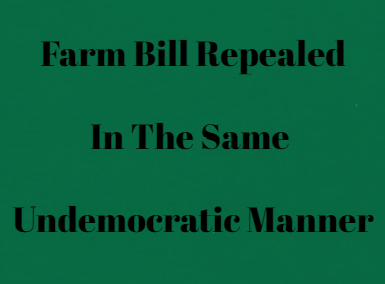

By Sunil Garodia
First publised on 2021-12-01 07:46:19
The government repealed the new farms bills on the first day of the winter session of Parliament as the Prime Minister had promised the farmers on Guru Nanak Dev's birth anniversary. But the process of repealing the bills once again showed that despite PM Modi's assurance that the government was ready to answer all queries on the bills, the government did not want the opposition to raise issues that would have embarrassed it. Using its brute majority in Lok Sabha, the bills were hurriedly repealed by voice vote. The same process was repeated, more disconcertingly, in the Rajya Sabha when it was doubtful whether the government had a majority in the house. This reaffirmed that the NDA government is not concerned about democratic conventions and traditions.
When one considers the fact that the bills were similarly rushed through Parliament when they were originally passed (after having been imposed through the ordinance route), it means that there was no scrutiny (as the bills were not referred to a standing or special committee of parliamentarians) or debate and discussion on the bills. Law making is a serious business that needs any new law to be properly vetted, scrutinized and debated upon by the representatives of the people who have been elected and sent to Parliament precisely for that purpose. By not allowing any debate on the bills either when they were enacted or when they were repealed, the government made a huge mistake.
Since the opposition parties have not been able to have their say on the provisions of the bills, the government is still in the dark about which provisions were not acceptable to them. As the farm unions steadfastly refused to have a clause-by-clause discussion to point out the infirmities, Parliament was the best forum for the government to find out why the bills were so vehemently opposed. Moreover, listening to the opposition would have built trust, a thing that is supreme when pushing through contentious legislation.
It needs to be recognized that what politicians say in public and what they say on record in Parliament is different and although it was known why the opposition parties were opposing the bills through their utterances in public, their considered, on-record opinion in Parliament would have helped the government in both winning their trust and drafting a better law with the backing of the opposition parties. That, in turn, would have helped it, together with the opposition parties, to bring the farm unions on board to usher in the much needed reforms in the agriculture sector. The government lost that opportunity through its haughtiness.











